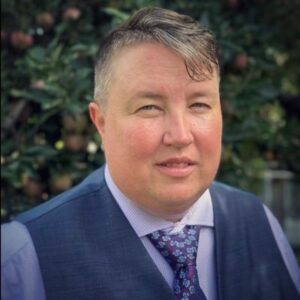Tanner fellows’ work-in-progress talks: Alexis Christensen, John Harfouch, Megan Weiss, Ataya Cesspooch, and Thérèse de Raedt
Robert Carson
Apr 20, 2025
Every spring, research fellows at the Tanner Humanities Center give work-in-progress talks in a casual setting and receive feedback from colleagues across campus. “Our community of fellows is at the heart of the Tanner Humanities Center, and our weekly works in progress talks are at the heart of the fellows’ community,” says Scott Black, Director of the Center. “The WIP workshops and presentations are also the best part of the Tanner fellowships for many of our fellows, and discussing their work is one of my favorite parts of my job too.”
 Alexis Christensen, Career Line Fellow:
Alexis Christensen, Career Line Fellow:
“A Cultural Companion to the Bacchanalian Conspiracy (186 BCE)”
(March 20) Christensen is producing a cultural companion for Livy’s account of the Bacchanalian Conspiracy of 186 BCE in his famous History of Rome, written some 150 years later. The book will provide context for Latin students reading Livy, explaining the historical, social, and cultural elements that Livy’s original audience would have understood. Christensen outlined the historical background of Rome’s expansion and cultural anxiety during this period, then summarized Livy’s dramatic—and highly inventive—narrative about the Bacchus cult and its regulation by Roman authorities. Although there is little definitive historical information about the cult, later accounts stress the sexual licentiousness of its rites and its propensity for violence.
Christensen shared three sample topics from her forthcoming book: the social status of the freed sex worker Hispala, who figures prominently in Livy’s narrative as a recognizable character type from Roman comedy; the design of elite Roman houses where much of the action takes place, with complex divisions of public and private areas; and the symbolic contrasts between day and night activities in Roman culture. In the Q&A, Christensen discussed the etymological aptness of the term conspiracy, which literally means breathing together; the Bacchanalian Conspiracy was not simply a plot or scheme, but an oath of unity.
 John Harfouch, Obert C. and Grace A. Tanner Humanities Center Visiting Research Fellow & Associate Professor, Department of Philosophy, University of Alabama in Huntsville:
John Harfouch, Obert C. and Grace A. Tanner Humanities Center Visiting Research Fellow & Associate Professor, Department of Philosophy, University of Alabama in Huntsville:
“Researching the Fayez Sayegh Archives”
(March 27) In the special collections of J. Willard Marriott Library are the Fayez Sayegh papers, an archive of over 400 boxes. The son of a Presbyterian minister in Syria, Sayegh (1922–1980) was a public intellectual who studied the political practices of Zionism, both before and after the founding of Israel. In particular, he sought to explain the Israel–Palestine conflict in material and economic terms, rather than in exclusively ethno-religious terms.
The Library has Seyegh’s papers and correspondence, works he was reading, as well as extensive records of his directorship of the Palestinian research center in Beirut. Of particular interest are documents related to his extensive lecture tours for Arab communities and college students in the United States. The library’s Sayegh collection—largely unstudied until now by Harfouch—is a vital resource in understanding the intellectual history of the ongoing conflict in the Middle East.
 Megan Weiss, Mormon Studies Fellow:
Megan Weiss, Mormon Studies Fellow:
“The Daughters of Utah Pioneers: A Study of Utah Heritage, Religion, and Gender”
(April 3) Weiss is writing the first comprehensive organizational history of the Daughters of Utah Pioneers (DUP), the state’s influential women’s heritage group. With unprecedented access to the DUP’s institutional archives, Weiss traces how the organization, founded in 1901 by Mormon women, evolved from a local heritage society into Utah’s primary keeper of pioneer history. Her research explores how the DUP used material artifacts, monuments, publications, and its building on Salt Lake’s Capitol Hill to shape Utah’s collective memory through the 20th century.
Weiss analyzes early members’ pursuit of respectability in broader American culture, as well as Kate B. Carter’s three-decade leadership during the Cold War era, when the DUP synthesized Pioneer heritage with American patriotism. Though not requiring LDS Church membership, the organization has had a complicated relationship with Mormonism, while simultaneously functioning as part of Utah’s integration into the “civil religion” of the United States. Questions touched on important contrasts with other heritage groups, such as the Daughters of the American Revolution and Daughters of the Confederacy, as well as the DUP’s recent inclusive approaches to remembering Utah’s Black and Indigenous populations during the Pioneer period.
 Ataya Cesspooch, Annie Clark Tanner Teaching & Research Fellow in Environmental Humanities:
Ataya Cesspooch, Annie Clark Tanner Teaching & Research Fellow in Environmental Humanities:
“Making Power: Oil and Gas, Land Relations, and Indigenous Sovereignty on the Northern Ute Reservation”
(April 8) Cesspooch, a PhD candidate in Environmental Science, Policy, and Management at UC Berkeley, is examining the Northern Ute Tribe’s negotiation of oil and gas development on tribal lands in Utah, which is the tribe’s primary source of revenue. In so doing, she challenges academic frameworks that presume an “ecological noble savage” stereotype of indigenous people taking romantic stands against extraction and development. Rather, both openness to extraction (such as oil and gas development on tribal lands in Utah) and resistance to it (such as tribal resistance to the Keystone XL pipeline in the 2010s) are expressions of tribal sovereignty and self-determination, which can vary in unexpected ways.
Cesspooch’s analysis is multi-layered, including: the affective dimensions of members’ responses to polling and interviews; the place of oil and gas development in tribal culture and worldviews; and the complex legal and institutional structures which the Northern Ute tribe has navigated for decades. The question and answer session included discussions of ethnographic methods that outmaneuver settler and colonial paradigms, as well as the complexity of the U.S. “energy independence” agenda, in light of tribal self-determination.
 Thérèse de Raedt, Virgil C. Aldrich Faculty Fellow:
Thérèse de Raedt, Virgil C. Aldrich Faculty Fellow:
“Figuring Postcolonial Beaches”
(April 17) De Raedt explores beaches in former French colonies as complex contact zones which function as sites of cross-cultural interaction, labor and expropriation, departure, and trauma—rather than just leisure spaces. Beginning with the founding of Club Méditerranée in Tunisia, she illustrated how coastal spaces became exoticized and commodified through post-World War II tourism. Founded by Gerald Blitz in 1950 as an aspirationally egalitarian, humanistic model of leisure, Club Med later turned into a luxury commercial enterprise without any such pretensions.
Tunisian film has taken up these issues in complex and critical ways, as De Raedt shows in the case of several works: Ridha Béhi’s Soleil des Hyènes (1977); Nouri Bouzid’s Bezness (1992); Ali Abidi’s, Ellombara; and the state-sponsored TV series, Harga (dir. Lassaad Oueslati, 2021). Throughout, the beach represents a threshold between worlds: for tourists, a space of leisure; for locals, a site of work or departure; and for migrants, the first step into exile or potentially death, as seen in makeshift cemeteries along the Tunisian coast for those who perish attempting to cross to Europe. Discussion in the Q&A explored neoliberalism, in addition to postcolonialism, as a framework for understanding these films and their context, in light of the capital mobility and economic precarity they dramatize.
